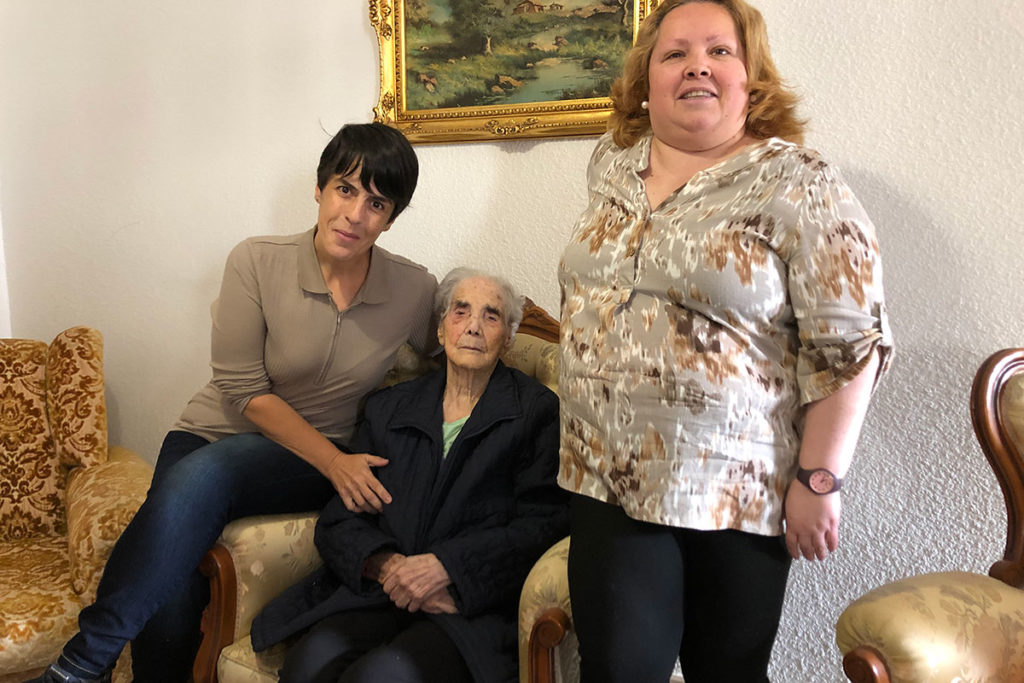Maria Dolores warmly greets us in her living room in San Miguel de Abona, wearing a friendly expression along with a gentle smile. She is about to celebrate her 103rd birthday on May 8th. She introduces herself in a traditional manner: “I am María Dolores Delgado Pérez, at your service and God’s.” She quickly mentions: “I have not lost my mind,” and when asked if she ever thought she would live past a century, she replies: “Well! Not really, I never imagined reaching this age.”
She playfully shares the secret to her long life: “Maybe it was the hunger I endured,” she suggests. When pressed further, she includes in her age-old recipe “milk with gofio, stew and leading a peaceful life, because nowadays people are restless, they are constantly on the move, running from one place to another, and everything seems insufficient to them.”
Maria Dolores exudes a special charm in her eyes, gestures, and responses to each question. She expresses being “very happy” with her family, consisting of two children (one passed away last year), 13 grandchildren, “more than 15” great-grandchildren, and a “small and very beautiful” great-granddaughter born in 2023.
She admits to not sleeping much, just “a few hours,” but before that, she prays every night – “quietly so as not to disturb my granddaughter” – to Brother Pedro, the Virgin of Candelaria “and all the saints.” “I ask for good health for everyone, an end to wars, and that people have job opportunities,” she adds.
However, life for this San Miguel resident has not been smooth. “I lived through very harsh times, when there was scarcity of food and nothing to buy. There were no job opportunities, just misery and extreme hunger, we had to fight to survive.” She emphasises that the past was “extremely tough” and they faced “numerous hardships.” “It’s nothing like today’s life, where there are too many conveniences; nowadays kids are asked what type of sandwich they want, there’s this, there’s that… back then, there was nothing.”
She recounts eating “whatever was available”, which could be “salted fish heads, scrambled gofio, broth, onions, white or even black stew. And potatoes, people survived on potatoes.” During those times, she recalls, there was no electricity and scarce water supply. “You had to fetch water from the ponds. I carried a lot of water, placed a cloth or towel on my head, and off I went, walking.”
She met her husband at a local dance, and “we fell in love at first sight, I had no other suitors but him,” though she admits that “more than being pretty, I was determined, I was a fighter.” During those festive days, people from other towns in the South would visit San Miguel. “We danced, sang, and had more fun; now it’s just chaos with that booming music.”


She also values the close-knit and supportive relationships among neighbours. “We would visit each other, help one another; if someone lacked pumpkins, they would give, if someone needed potato broth, it was provided; we all lived harmoniously, now everyone is just at home.” Back then, San Miguel was comprised of “four houses, with neighbours leaving doors unlocked and keys outside, unlike now, where everyone is here and people seem frantic. We used to be happier because we were more relaxed, when the sun set, we slept.”
Since her health started to deteriorate, Don Eduardo became her health guide, a pillar of healthcare for her generation: “He was an excellent and affordable doctor, I visited him and he later came to my new house.” She visited Santa Cruz a couple of times, “not for leisure but to accompany my sick husband. I’ve had my share of challenges.”
Reflecting on special occasions like Christmas, she describes how “those who had food enjoyed themselves” and how the Three Wise Men brought “an orange and a handful of almonds.” In her remarkable memory, she reserves a special place for Doña Esther, a schoolteacher who left a significant impact on the town. “I worked as her maid, although nowadays she would be called a housekeeper, but I was also her friend, I worked beside her for many years, she was very respectful and kind.”
She advises today’s youth to “approach life differently, as nowadays they swiftly change partners, leading to marital strife. I dislike such occurrences. Families should be more united, as I see young people nowadays feeling lost.”
Doña Dolores confesses that she finds entertainment in television and radio, listening to them from the moment she has her morning “cortadito,” her starting beverage of the day: “I enjoy listening to music and catching up on the news, though it can be upsetting, with all the warfare going on.” Asked about politics, she remarks: “I don’t quite understand it, it seems odd to me.”
She enjoys dishes like broth, purée, mashed vegetable stew, yogurt, and “a bit of custard, as I have a sweet tooth.” She stresses that “I eat in moderation, but I have all my senses intact.”
Approaching 103 years of age, thoughts of death do not haunt her. “It will come when it has to, but I do not dwell on it yet, when the time comes, it comes. Presently, I pray and reminisce a lot about my son, whom I miss greatly. I maintain hope in the existence of God and a better afterlife. That’s what I believe.”
As we switch off the recorder and inform her that the interview is concluded, we share an endless hug with the endearing grandmother from San Miguel. “I enjoy these events, interviews, anything involving conversations,” she tells us, before bidding farewell with a question: “Are you leaving without even having a quick drink?”
















